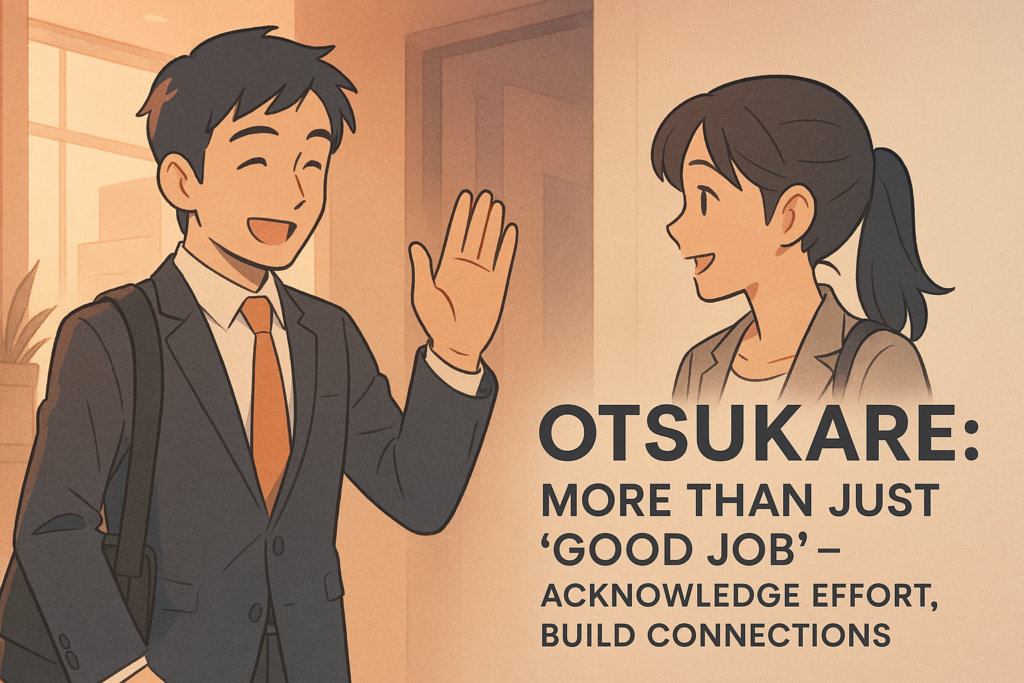Have you ever found yourself struggling to express appreciation in Japanese? While English has the simple “good job” or “well done,” Japanese offers something much more nuanced – the versatile expression “otsukare” (おつかれ). This seemingly simple phrase carries cultural weight that reflects Japan’s deep respect for hard work and dedication.
Want to learn Japanese faster?
Book a free 15-minute call to create your personalized study plan. Get expert tips, guidance, and answers to all your questions. One-on-one!
What Does Otsukare Mean?
At its core, “otsukare” (おつかれ) stems from the verb “tsukareru” (疲れる), meaning “to become tired.” When we break down the word:
- “O” (お) is an honorific prefix adding politeness
- “Tsukare” (つかれ) is the stem form of “tsukareru”
- “Sama” (さま) in its longer form adds respect
The complete expression “otsukaresama” (おつかれさま) literally translates to “you must be tired,” but culturally conveys appreciation for someone’s efforts. It acknowledges both the work done and the energy expended.
Otsukare means “you must be tired from your hard work.”
When to Use Otsukare in Daily Japanese Life
Unlike the occasional “good job” in English, otsukare functions as both a greeting and acknowledgment in Japanese daily life. Here’s when you’ll commonly hear it:
- Workplace farewells: When leaving the office (especially before others)
- Meeting conclusions: At the end of work gatherings
- Passing colleagues: As a hallway greeting acknowledging ongoing work
- Task completion: After someone finishes a project or assignment
- Sports and performances: After physical exertion or creative effort
The phrase creates a moment of connection, recognizing that work requires effort and deserves acknowledgment. Similar to how “tasukete” works as an essential phrase when seeking help, otsukare serves as a fundamental expression of workplace respect.
Politeness Levels: Mastering Otsukare Variations
Like many Japanese expressions, otsukare appears in multiple forms depending on formality. Using the right version shows your cultural awareness:
1. Casual Forms
- Otsu (おつ): Ultra-casual, only for close friends
- Otsukare (おつかれ): Informal but respectful, for peers and friends
2. Standard Forms
- Otsukaresama (おつかれさま): Standard politeness for most workplace situations
3. Formal Forms
- Otsukaresama desu (おつかれさまです): Formal version for most professional contexts
- Otsukaresama deshita (おつかれさまでした): Past tense formal version, often used with superiors
This range of formality mirrors other Japanese expressions like those featured in our 25 useful Japanese anime phrases guide, demonstrating how context shapes language use.
How to Respond When Someone Says Otsukare to You
When someone offers an “otsukare,” the appropriate response depends on your relationship and the situation:
- With peers: Respond with the same level, typically “otsukaresama desu”
- With superiors: Use “otsukaresama deshita” to show added respect
- When only you worked: A simple “arigatou gozaimasu” (thank you) works well
This exchange creates a mutual acknowledgment that strengthens workplace relationships, similar to how “watashi” functions in self-introductions to establish connection.
Ready to pass the JLPT N5 fast?
Master the basics of Japanese with our complete JLPT N5 Study Guide. Step-by-step roadmap, study methods, and mock tests. All in one guide!
Beyond Otsukare: Alternative Expressions
While otsukare works in most situations, Japanese offers other expressions for specific contexts:
Gokurosama (ごくろうさま)
Used specifically by superiors to subordinates, this phrase carries a nuance of “thank you for your trouble” and should only be used when you have higher status.
Otsukare-chan (おつかれちゃん)
A cute, very casual version sometimes used among close female friends or in certain regions.
Okaerinasai (おかえりなさい)
While not directly an “otsukare” alternative, this “welcome back” phrase often accompanies otsukare when someone returns from an effort.
For more expressions beyond the basics, check out our comprehensive Japanese onomatopoeia list to add color to your conversations.
Cultural Context: Why Otsukare Matters
The prevalence of “otsukare” reveals important aspects of Japanese work culture:
- Acknowledgment of effort: Work itself deserves recognition regardless of outcome
- Community orientation: The phrase connects people through mutual respect
- Ritualized appreciation: Daily use creates reliable social structures
Understanding phrases like otsukare helps foreign workers navigate Japanese workplaces more successfully, building stronger professional relationships through linguistic awareness.
Tips for Using Otsukare Naturally
To integrate otsukare into your Japanese language repertoire:
- Watch the timing: Use it when leaving work or after someone completes a task
- Match your tone: Keep it bright and appreciative, not flat
- Consider body language: A slight nod or bow often accompanies the phrase
- Note the context: Listen for which version others use in different settings
For more language learning support, download our free Japanese learning guides packed with practical expressions like otsukare.
Q&A: Common Questions About Otsukare
Q: Can I use otsukare with people I’ve just met? A: Yes, but stick with the formal “otsukaresama desu” until you understand your relationship better.
Q: Is it appropriate to say otsukare to service workers? A: Yes, many Japanese people say it to acknowledge service staff’s efforts.
Q: Does otsukare have a negative connotation of exhaustion? A: No, it’s a positive acknowledgment of effort, not a criticism of being tired.
Q: How do Japanese people pronounce otsukare correctly? A: “Oh-tsu-ka-reh” with a flat intonation on each syllable.
Conclusion: Adding Otsukare to Your Japanese Vocabulary
Mastering expressions like “otsukare” takes you beyond textbook Japanese into authentic cultural understanding. This simple phrase opens doors to meaningful connections in Japanese workplaces and social settings by acknowledging what Japanese culture values most: dedicated effort and mutual respect.
Whether you’re studying Japanese for business, travel, or personal interest, incorporating otsukare into your daily vocabulary demonstrates cultural sensitivity that Japanese speakers appreciate. Start practicing today, and watch how this simple expression transforms your interactions.
Ready to expand your Japanese knowledge? Explore our guide on mastering the Japanese future tense to express your plans confidently in any situation.
Love Japan? Stay in the Loop!
Get the best of Japan straight to your inbox: language, culture & travel insights!




